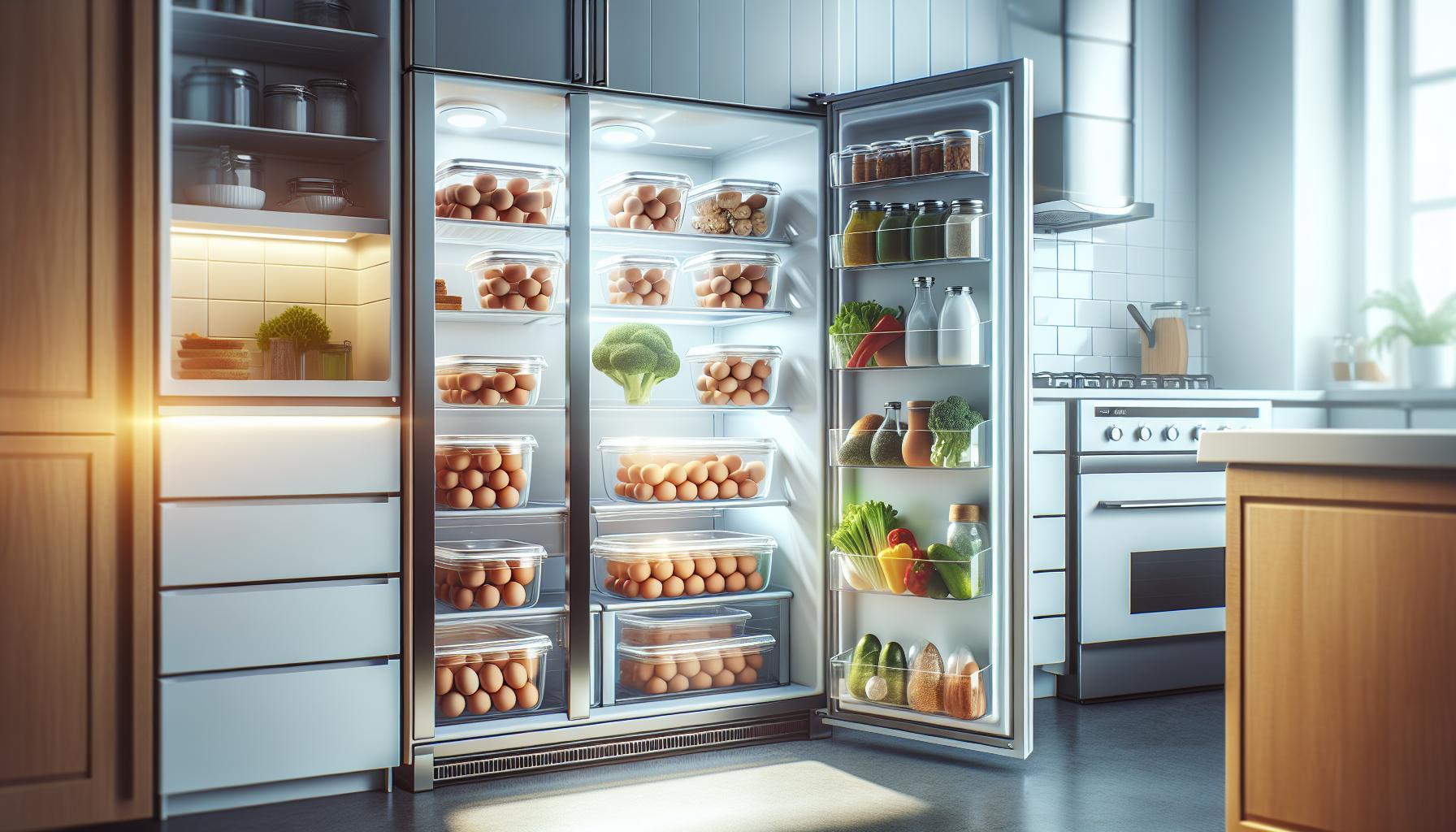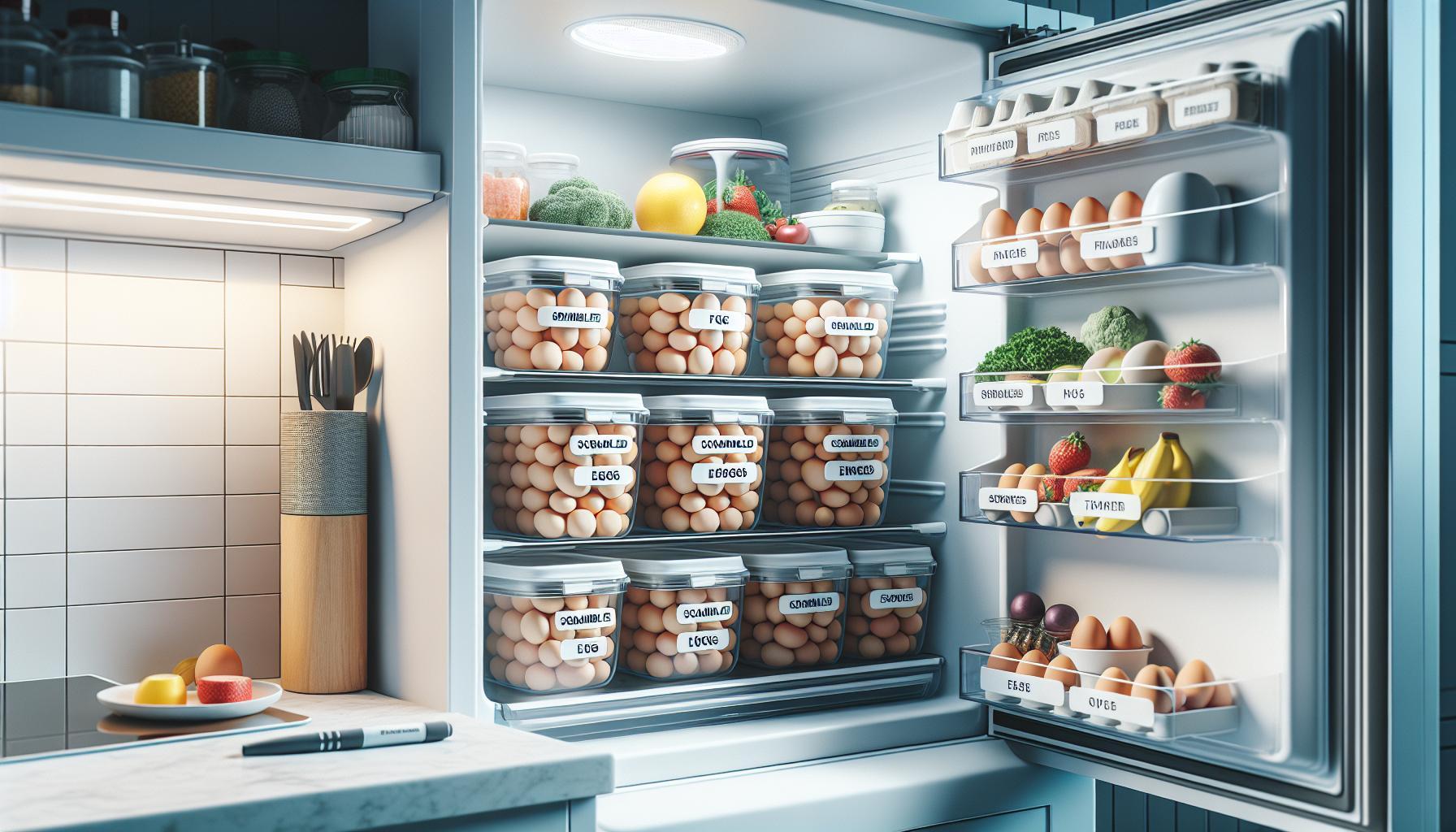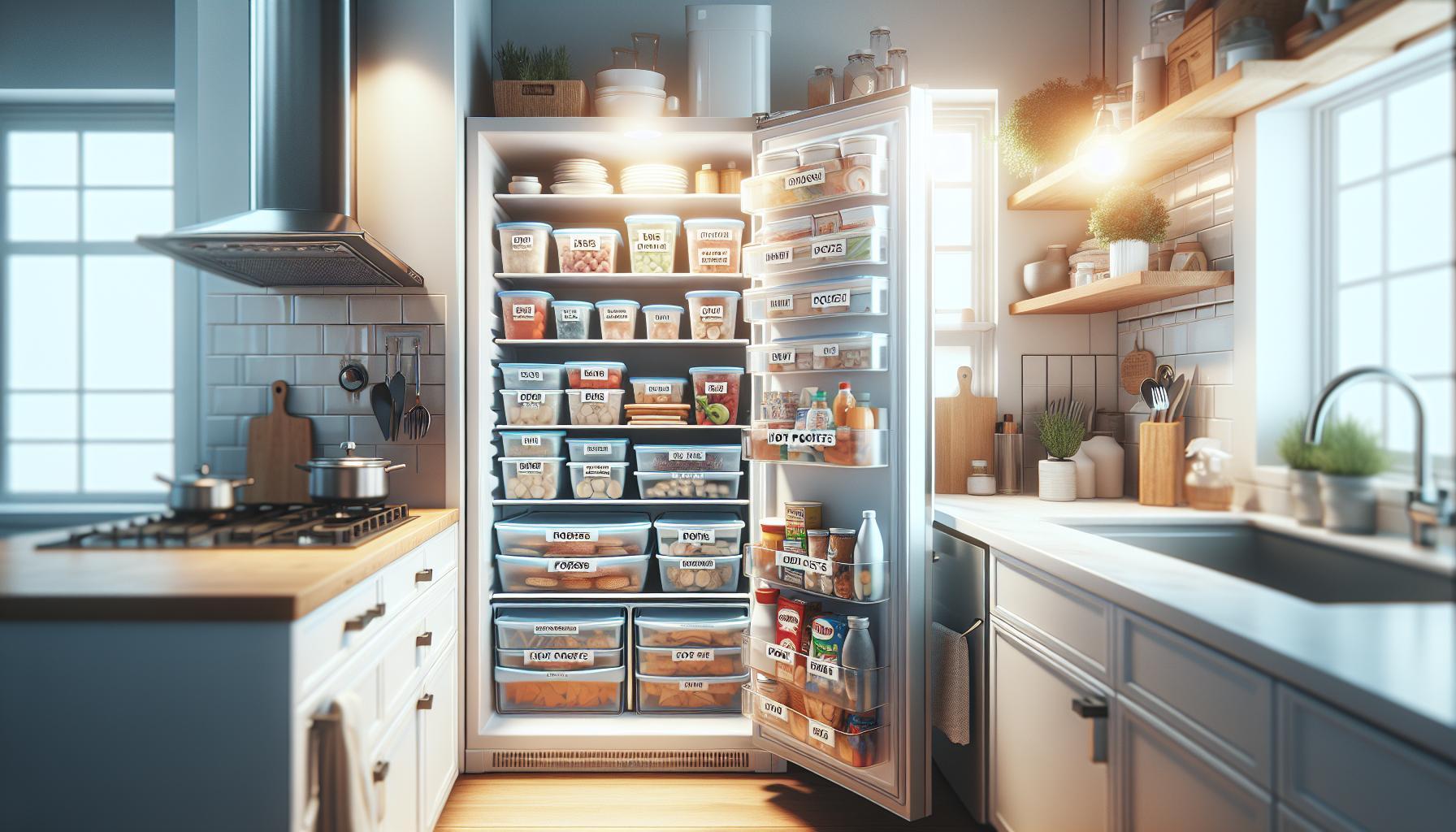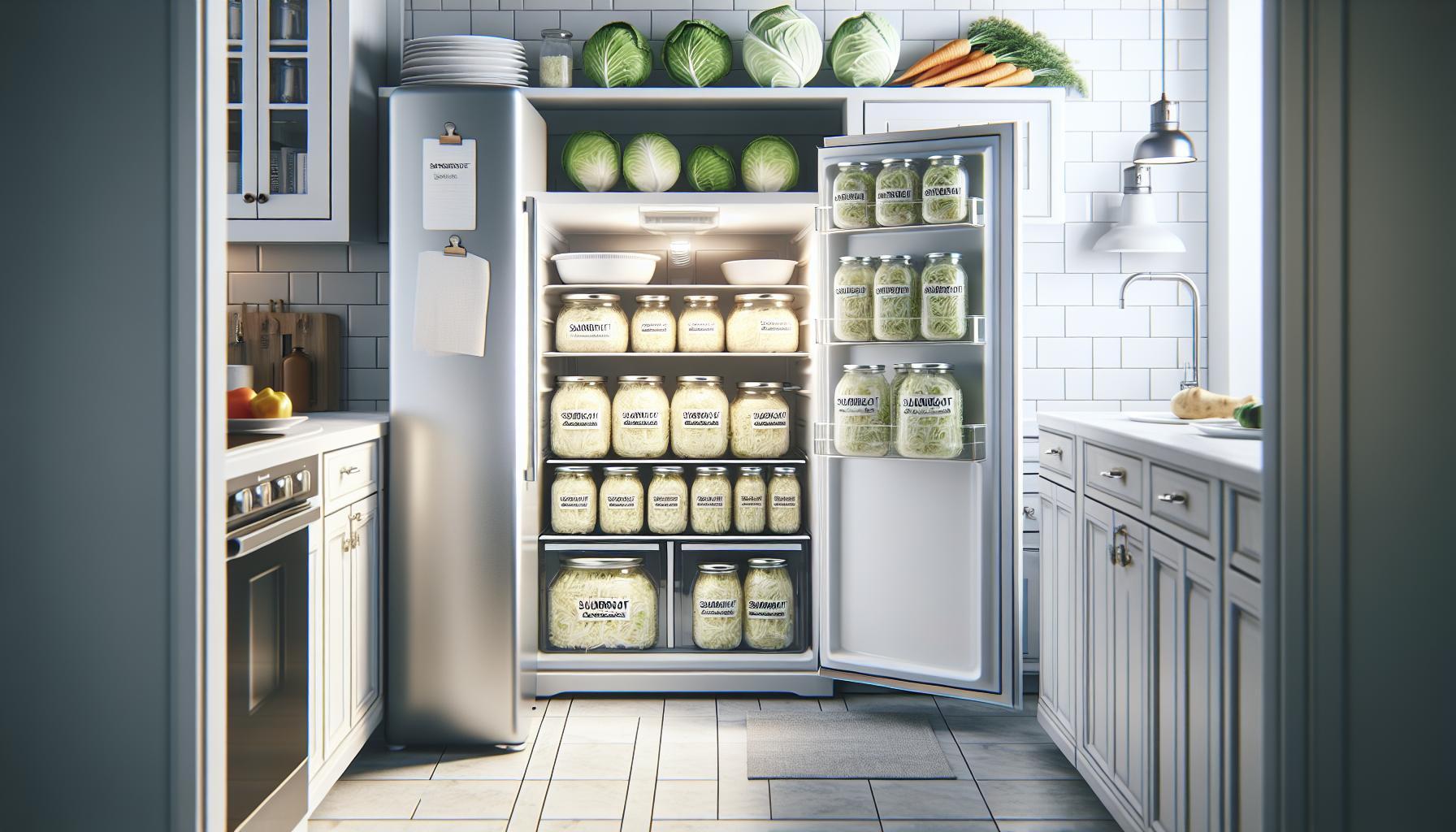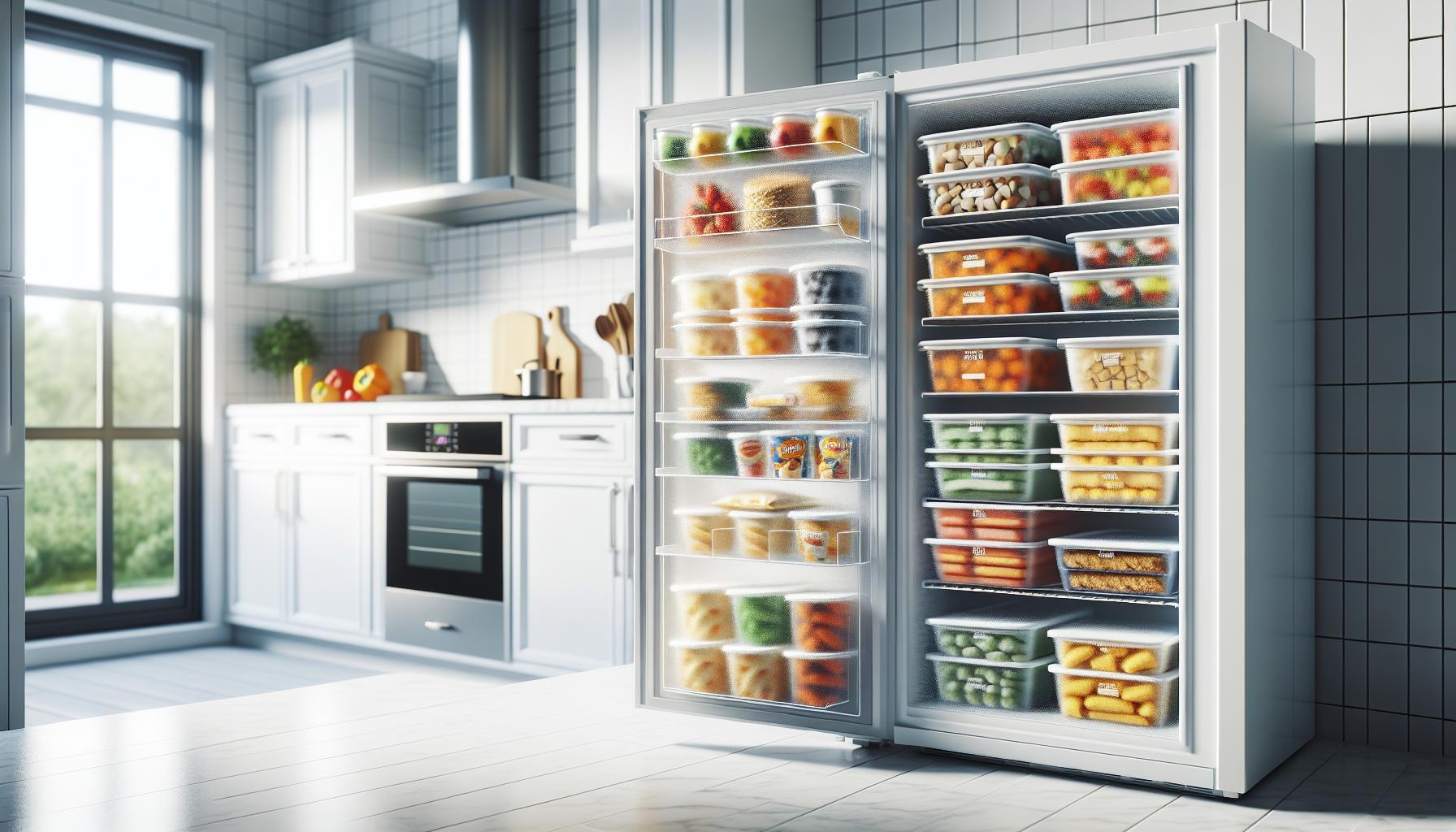Did you know that nearly 79,000 people in the U.S. fall ill from Salmonella each year, often linked to improper egg handling? Cooked eggs, whether scrambled, boiled, or in a casserole, can offer a delightful and nutritious addition to your meals, but knowing how long they last in the refrigerator is crucial for your health and food safety.
Understanding the proper storage duration for cooked eggs can help you avoid spoilage and reduce food waste, ensuring that your leftovers remain safe to eat. As you consider the delightful dishes you can create with eggs, let’s dive into the essential guidelines for storing cooked eggs correctly, so you can enjoy their tasty benefits without worry. Keeping your kitchen practices mindful not only supports your health but also brings peace of mind as you plan your next meal!
How Long Do Cooked Eggs Last in the Refrigerator?
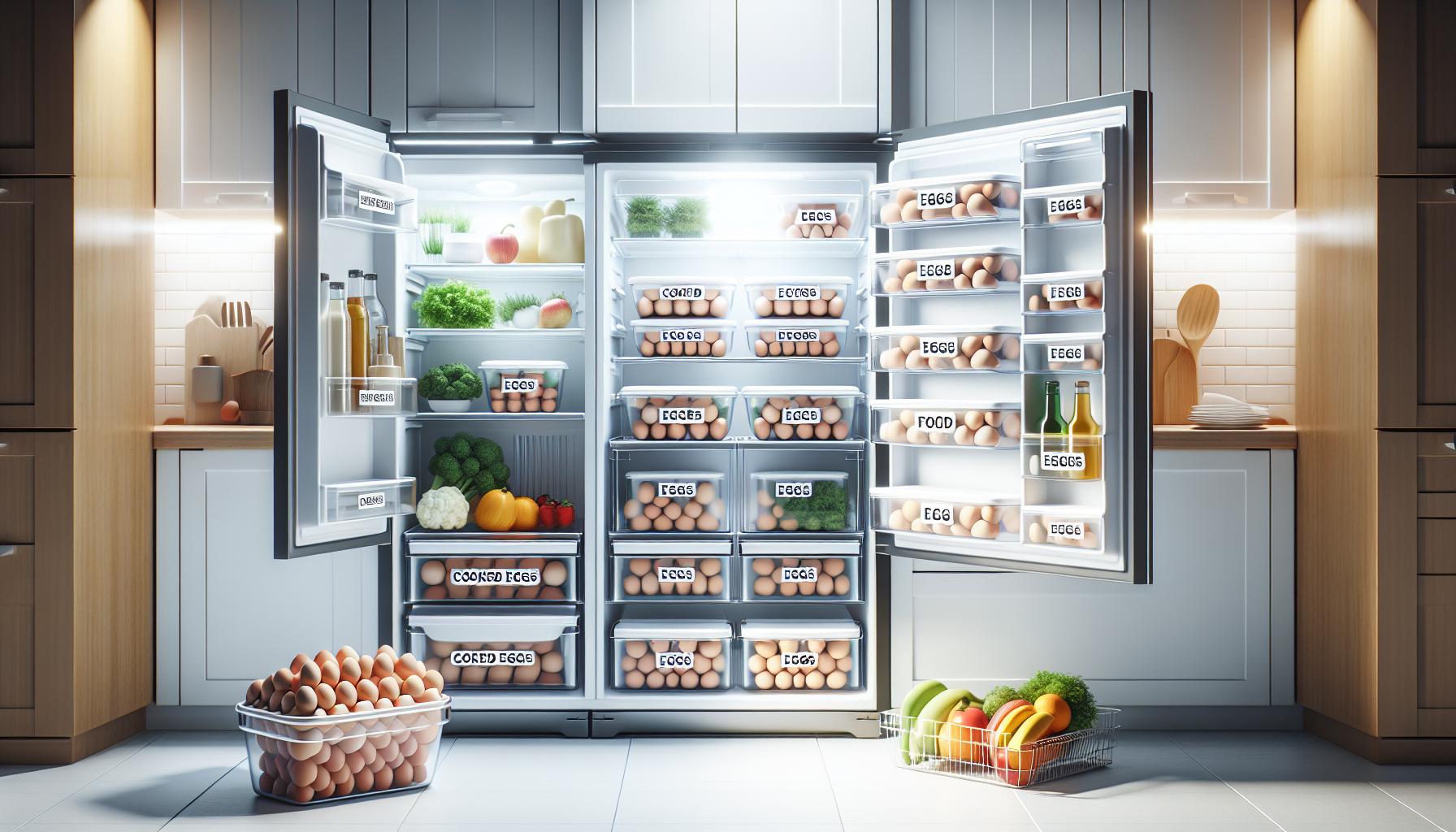
Cooked eggs are a versatile ingredient in many kitchens, but knowing how long they last in the refrigerator is crucial for food safety. Generally, cooked eggs, such as hard-boiled eggs and scrambled eggs, can be safely stored in the refrigerator for up to one week. This time frame is essential to ensure you enjoy their flavor and texture while minimizing the risk of foodborne illnesses, such as Salmonella, which can occur when eggs are improperly stored or kept for too long[2].
When storing cooked eggs, it’s best to place them in a sealed container in the fridge. For hard-boiled eggs, leaving the shells on until you’re ready to eat can help maintain moisture and freshness. If you decide to peel them, be sure to cover them in a container to prevent them from drying out. Furthermore, refrigeration should be done within two hours of cooking to ensure the best quality and to inhibit bacterial growth.
It’s important to note that the method of cooking can affect storage duration slightly. For example, fried eggs may last a bit shorter than their boiled counterparts, typically around 3-4 days, due to the potential for increased moisture and fat content from oils or butter. Keeping an eye on their appearance and smell is also crucial; any changes in texture or an off odor can be indicators that the eggs have spoiled. By following these guidelines, you can maximize the freshness of your cooked eggs and ultimately enjoy them safely.
Understanding the Factors Affecting Egg Freshness
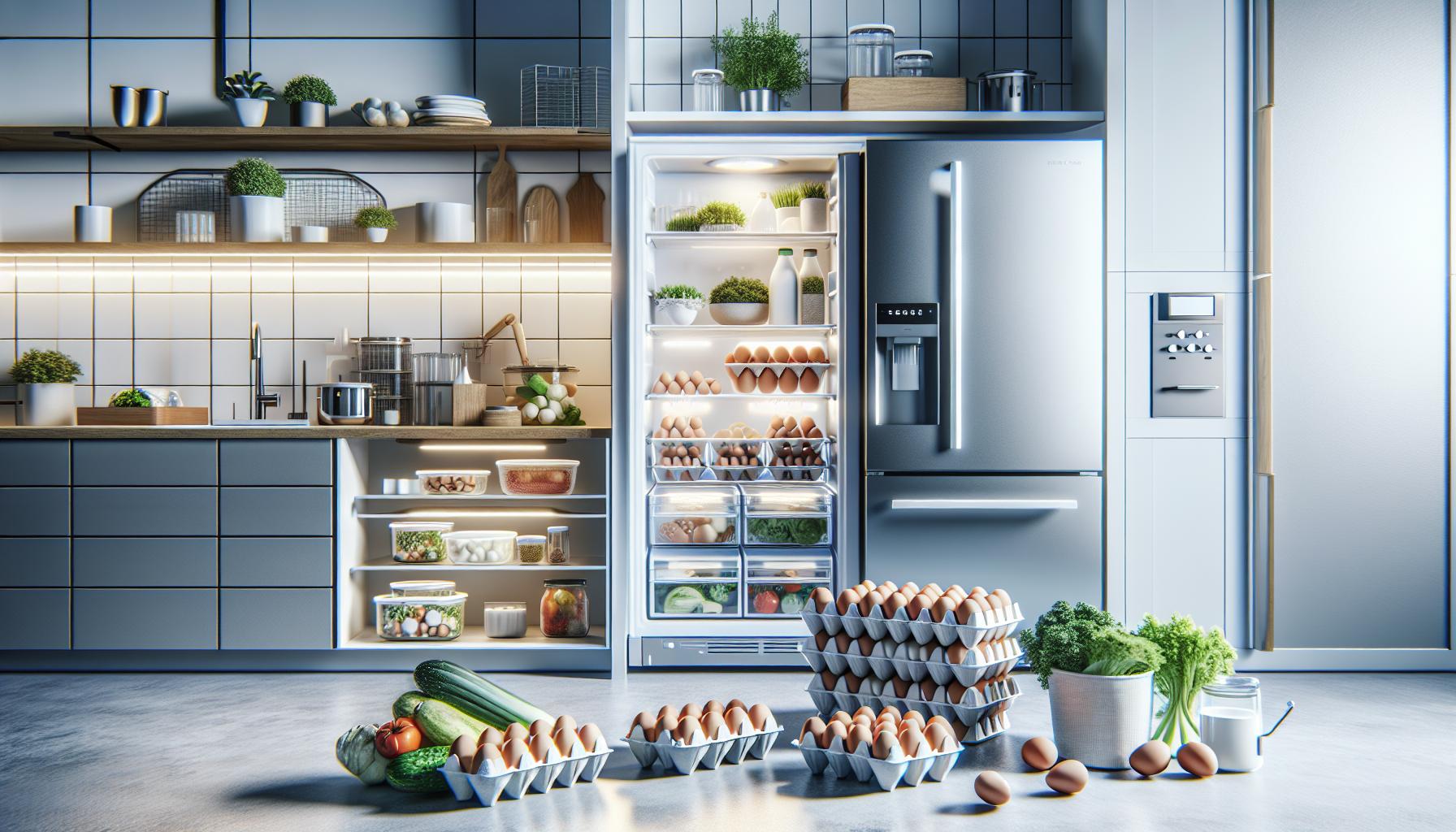
Cooked eggs are a popular ingredient, but the priority should always be ensuring their freshness for safe consumption. Several factors influence how long cooked eggs can be safely stored in the refrigerator, including temperature, cooking methods, and storage practices. Understanding these elements can significantly enhance the safety and quality of your cooked eggs.
One of the most crucial aspects is temperature. Cooked eggs should be refrigerated as soon as they cool down-ideally within two hours after cooking. Storing them at temperatures below 40°F (4°C) is essential to prevent the growth of harmful bacteria. Additionally, the method of cooking impacts the egg’s moisture content and structure, which can affect storage duration. For example, scrambled eggs may spoil faster (generally within 3-4 days) compared to hard-boiled eggs, which can often last up to a week when stored properly.
The way you store your cooked eggs plays a vital role in maintaining their freshness. Utilize airtight containers to limit their exposure to air and odors from other foods. If you’re dealing with hard-boiled eggs, keeping the shells on until you’re ready to eat them can significantly help in retaining moisture and preventing spoilage. Once peeled, ensure they are covered adequately to prevent drying out. Being mindful of all these factors will enhance your enjoyment of cooked eggs while ensuring your health and safety.
The Importance of Proper Egg Storage Techniques
Proper storage techniques are crucial for maintaining the freshness and safety of cooked eggs, helping to prevent spoilage and foodborne illnesses. After cooking, eggs should cool down quickly-preferably within two hours-and be stored in the refrigerator at temperatures below 40°F (4°C). This temperature barrier significantly hampers the growth of harmful bacteria that thrive in warmer conditions.
To maximize freshness, cooked eggs should be stored in airtight containers. This limits their exposure to air and prevents contamination from other foods, which is particularly important for items that possess strong odors. For example, hard-boiled eggs should ideally remain in their shells until consumption. The shell acts as a natural barrier, preserving moisture and taste. Once peeled, eggs should be covered securely to protect against drying out or absorbing surrounding odors.
While different types of cooked eggs have varying shelf lives-scrambled eggs typically last about 3-4 days while hard-boiled eggs can last up to a week-consistency in storage practices plays a pivotal role. Furthermore, labeling containers with the date of cooking can aid in tracking freshness, ensuring they are consumed promptly. By adopting these strategies, you can enjoy cooked eggs safely and deliciously, minimizing waste and enhancing your culinary experience.
Signs Your Cooked Eggs Have Spoiled
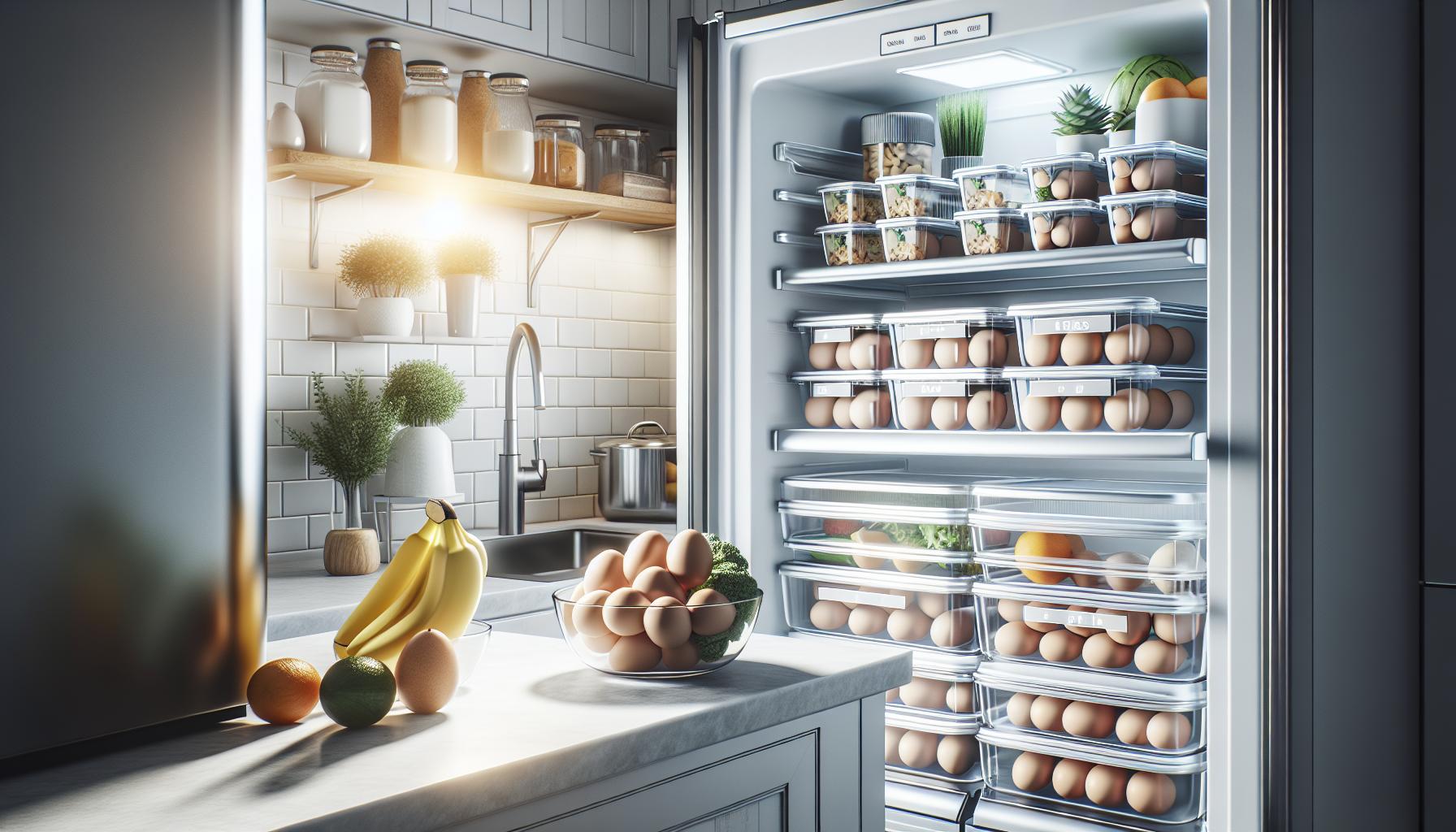
Identifying when cooked eggs have spoiled is crucial for maintaining food safety and preventing potential health risks. Spoiled cooked eggs can pose a significant risk of foodborne illnesses, so knowing the signs can help you make informed decisions about what to eat. One of the most recognizable indicators of spoilage is the odor. Fresh cooked eggs typically have a neutral smell, while spoiled eggs may emit a sulfur-like or off-putting odor. If you notice any unusual scent, it’s best to err on the side of caution and discard the eggs.
Texture changes can also signal that cooked eggs have gone bad. Fresh scrambled or hard-boiled eggs should have a moist, firm texture. If you observe a slimy surface or any kind of excessive dryness or chalkiness, that’s a strong indicator they may no longer be safe to eat. Additionally, discoloration is another telltale sign. While it’s normal for some cooked eggs to lose a bit of their vibrant color over time, any greenish or grayish tint especially around the yolk indicates spoilage due to a reaction with iron in the yolk and sulfur in the white during cooking.
To ensure you are consuming safe food, always check your cooked eggs after the recommended storage period-typically 3 to 4 days for scrambled eggs and up to a week for hard-boiled eggs. Utilizing proper storage strategies, such as storing them in airtight containers and labeling them with the date of cooking, can significantly reduce the risk of consuming spoiled eggs. If in doubt about the safety of your cooked eggs, it’s always better to throw them away than risk a foodborne illness.
How to Store Cooked Eggs for Maximum Freshness
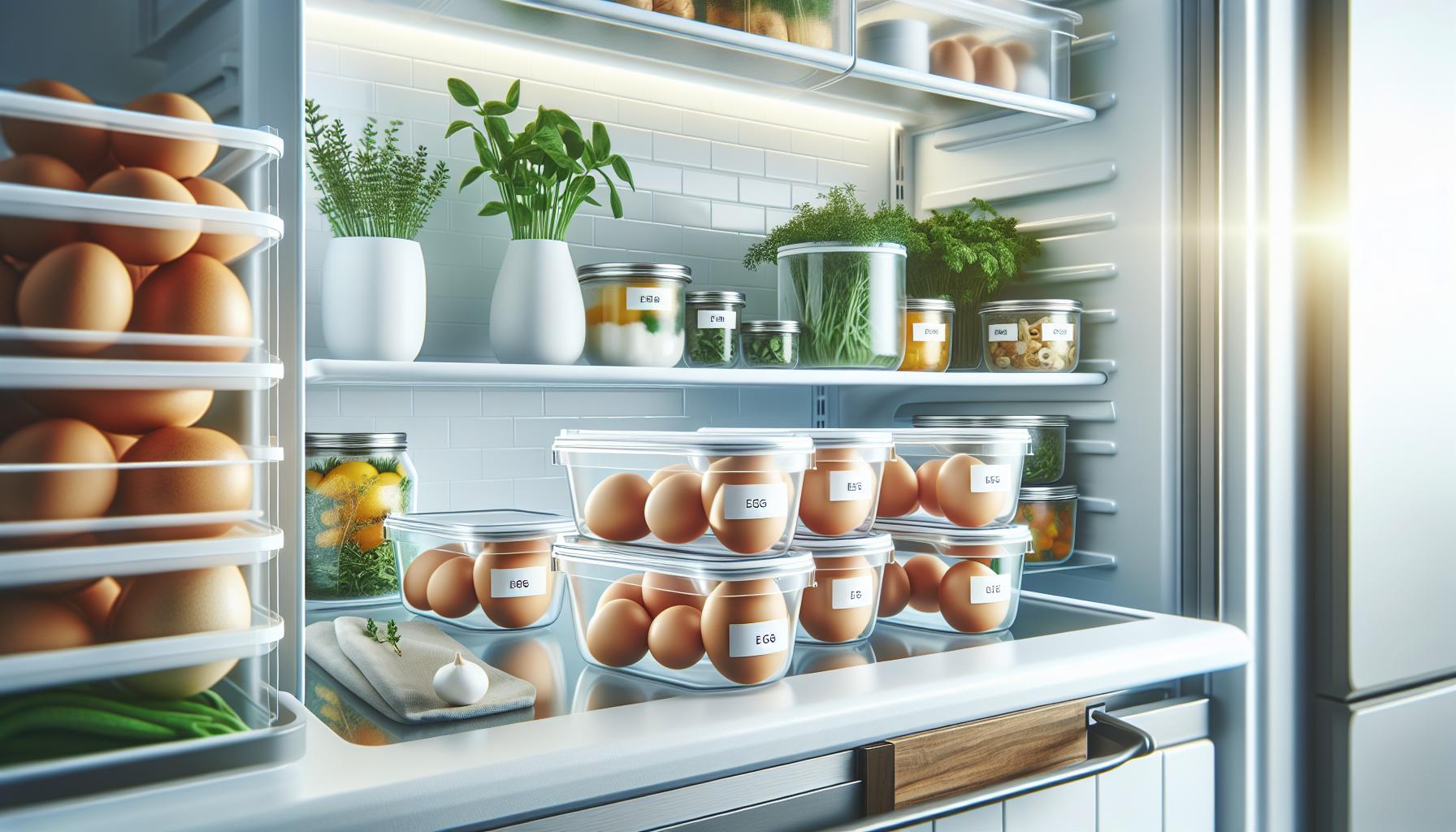
To maintain the freshness and safety of cooked eggs, proper storage techniques are essential. Cooked eggs can be a convenient and nutritious component of your meals, but they require the right approach to avoid spoilage and foodborne illness. Start by cooling your cooked eggs at room temperature for no more than two hours after cooking; this minimizes the time they spend in the temperature danger zone (between 40°F and 140°F) where bacteria can thrive.
Once cooled, it is important to transfer your cooked eggs into airtight containers. This step not only keeps air and moisture out, which can lead to spoilage, but also helps prevent the eggs from absorbing odors from other foods in the refrigerator. For hard-boiled eggs, it’s best to leave the shells on until you’re ready to eat them, as the shell serves as a natural protective barrier. If you’ve already peeled eggs, store them in water in a sealed container to help maintain moisture content.
Keeping track of when your eggs were cooked is also crucial. Label your containers with the cooking date, ensuring that you consume them within the recommended timeframe-typically 3 to 4 days for scrambled eggs and up to a week for hard-boiled eggs. By adhering to these guidelines, you can enjoy your cooked eggs safely and effectively, reducing the risk of foodborne illnesses while maximizing their flavor and nutritional benefits.
For additional peace of mind, consider keeping your refrigerator at the ideal temperature of 40°F (4°C) or lower. This not only preserves the quality of your eggs but also benefits all the perishable items you store. Following these best practices will help ensure that your cooked eggs stay fresh and delicious, making them a reliable addition to your meals.
Best Practices for Reheating Cooked Eggs Safely
Reheating cooked eggs can be straightforward, but it requires careful attention to ensure they remain safe to eat and enjoyable in taste and texture. Whether you’re warming up hard-boiled eggs for a quick snack, using scrambled eggs in a breakfast burrito, or reheating a quiche, following specific practices will help you avoid foodborne illness and maintain quality.
To safely reheat cooked eggs:
- Microwave with Caution: If using a microwave, place the eggs in a microwave-safe dish and cover them with a paper towel. This helps to retain moisture. Heat in small increments of 15-30 seconds until warm, stirring in between if necessary to avoid uneven heating, which can toughen the eggs.
- Avoid Overheating: Cooked eggs can become rubbery if overheated, so aim for just the right amount of warmth. Consider that eggs heated directly from refrigeration should be consumed within 2 hours to remain safe.
- Stovetop Method: For scrambled eggs or dishes like frittatas, reheating in a skillet over low heat can be beneficial. Add a splash of milk or water to help steams the eggs and keep them from drying out.
- Oven Reheating: For larger dishes like quiches or casseroles, reheat in an oven preheated to 350°F (175°C) for about 10-15 minutes, or until the center reaches a safe temperature of 165°F (74°C).
Always check for signs of spoilage before reheating, as consuming spoiled eggs can pose health risks. If the eggs have an off smell or unusual texture, it’s best to discard them. When reheating, ensure that they are heated thoroughly to avoid cold spots where bacteria can survive. Use a food thermometer to confirm that the internal temperature of the eggs reaches at least 165°F (74°C) if you’re reheating dishes that include eggs.
By staying mindful of these reheating practices, you can enjoy your cooked eggs safely while preserving their flavor and texture. Making sure to reheat promptly and store leftover egg dishes properly will help you avoid the unfortunate experience of spoilage, ensuring that your meals are not only delicious but safe to consume.
Different Types of Cooked Egg Dishes and Their Shelf Lives
Knowing the shelf life of various cooked egg dishes is essential for minimizing waste and ensuring safety in your kitchen. Cooked eggs can be a delicious and nutritious part of your meals, but their longevity varies depending on how they’ve been prepared. Here’s a breakdown of common cooked egg dishes and their recommended refrigerator storage times to help you avoid spoilage.
Hard-boiled eggs are perhaps the most straightforward example. When stored properly, they can last up to one week in the refrigerator. This applies whether they are peeled or still in the shell, although it’s best to keep them in their shells to maintain freshness and prevent them from absorbing odors from other foods.
Scrambled eggs, on the other hand, should ideally be consumed within 3 to 4 days when stored in the fridge. They often become dried out or rubbery if stored for longer periods, so consuming them promptly is key for both flavor and safety. Similar guidelines apply to frittatas and omelets, which can also last about 3 to 4 days in the refrigerator if stored in an airtight container.
Another popular dish, quiche, has a slightly longer shelf life. When kept in the fridge, a freshly baked quiche can remain good for 3 to 5 days. Make sure it is covered to prevent it from drying out or absorbing unwanted flavors. Conversely, deviled eggs should be devoured quickly; they can last 2 to 3 days in the fridge because the addition of mayonnaise can affect their stability over time.
For those looking to preserve cooked egg dishes beyond refrigeration, consider freezing. While certain dishes like scrambled eggs do not freeze well due to changes in texture, hard-boiled eggs can be frozen for up to six months if peeled. However, it’s important to note that the texture may alter when they are thawed, so it’s best to use them in dishes where texture is less crucial.
Keeping track of how long different cooked egg dishes can last will not only help you enjoy them at their best but also enhance food safety in your home. Always store them in airtight containers and label them with the date they were cooked to ensure you stay within these timeframes.
The Risks of Eating Spoiled Cooked Eggs
Eating spoiled cooked eggs poses significant health risks that can lead to foodborne illnesses. Understanding these risks is crucial, especially since eggs are a common ingredient in many meals. When cooked eggs are left beyond their recommended storage times, they become breeding grounds for bacteria such as Salmonella, which can multiply rapidly under the right conditions. Symptoms of Salmonella infection can range from gastrointestinal distress to severe illness, including nausea, vomiting, and even hospitalization in vulnerable populations like the elderly or young children.
One major concern is improper storage. Cooked eggs need to be refrigerated promptly within two hours of cooking to prevent the growth of harmful bacteria. Leaving them out at room temperature increases the risk of spoilage. Once cooked, the freshness of eggs diminishes quickly; for example, scrambled eggs should ideally be consumed within 3 to 4 days while hard-boiled eggs can last up to a week. If these timelines are exceeded, the chances of their spoiling significantly increase.
In addition to bacterial growth, the quality of cooked eggs declines over time. Spoiled eggs may emit off-odors, develop an unusual texture, or even change color. Consuming eggs that exhibit any of these signs can lead to food poisoning. To minimize risks, always store cooked eggs in airtight containers and label them with the date they were prepared. This practice not only helps in tracking their freshness but also ensures food safety in your kitchen.
When in doubt, it’s always safer to err on the side of caution. If you suspect that cooked eggs have gone bad-even if they don’t show obvious signs-the best course of action is to discard them. Food safety is paramount, and a moment of caution can prevent days of illness.
Can You Freeze Cooked Eggs? What You Need to Know
Freezing cooked eggs can be a game-changer for meal prep enthusiasts and those looking to minimize food waste. Surprisingly, while freezing raw eggs can alter their texture, cooked eggs preserve their taste and are safe to freeze. This storage method can extend their shelf life significantly, allowing you to enjoy your favorite egg dishes long after they’ve been prepared.
When it comes to freezing cooked eggs, preparation is key. You should avoid freezing dishes with mayonnaise or other creamy sauces, as these don’t freeze well. Instead, focus on plain cooked eggs or casseroles without cream-based components. To freeze, allow the cooked eggs to cool completely, then transfer them to airtight containers or heavy-duty freezer bags, removing as much air as possible. Label the containers with the date to track freshness. Cooked eggs can last in the freezer for up to six months, although for the best quality, it’s advisable to consume them within three months.
To reheat frozen cooked eggs safely, gently thaw them in the refrigerator overnight. You can then reheat them in a microwave or on the stovetop until heated through. While they may not have the same texture as when freshly cooked, they can still be delicious in breakfast scrambles, omelets, or egg-based casseroles. Always remember that the key to food safety is ensuring that cooked eggs are thawed and reheated properly to avoid any health risks associated with foodborne illnesses.
Expert Tips to Avoid Egg Spoilage at Home
To maintain the quality and safety of cooked eggs, implementing a few expert strategies can significantly extend their freshness and prevent spoilage. The natural shelf life of cooked eggs in the refrigerator can range from 3 to 7 days, depending on how well they are stored. Keeping these eggs safe and enjoyable requires thoughtful preparation and ongoing care.
One of the most effective ways to prevent spoilage is to store cooked eggs immediately after they have cooled down. Placing them in an airtight container is crucial as it significantly reduces their exposure to moisture and odors from other foods, which can lead to unwanted flavors and spoilage. Always make sure the container is appropriately labeled with the date of cooking, as this helps in tracking freshness and ensures you consume them within the safe timeframe.
Optimizing Your Refrigerator Environment
The temperature of your refrigerator plays a vital role in preserving cooked eggs. The ideal temperature for a safe food storage environment is at or below 40°F (4°C). Regularly checking the temperature with an appliance thermometer can help you ensure it remains consistent. Additionally, storing eggs on middle shelves rather than the door can provide a more stable temperature, as the latter is more susceptible to fluctuations each time the door is opened.
Another key practice is to avoid combining cooked eggs with other ingredients that spoil quickly, especially binary foods such as mayonnaise or cream. This can help you avoid cross-contamination and extend the shelf life of your egg dishes. When reheating cooked eggs, ensure they reach a safe internal temperature of 165°F (74°C) to effectively kill any harmful bacteria that may have developed during storage.
In summary, to keep your cooked eggs at their best, prioritize airtight storage, maintain a consistent refrigerator temperature, and avoid harmful ingredient pairings. Regularly inspecting for signs of spoilage, such as unusual textures or odors, can also go a long way in preventing foodborne illness and ensuring the wholesome enjoyment of your meals. By following these precautions, you can feel confident in your egg storage practices and enjoy them safely throughout the week.
Frequently Overlooked Egg Storage Mistakes
Storing cooked eggs may seem straightforward, yet many overlook critical mistakes that can lead to spoilage and waste. One of the most common errors is failing to cool cooked eggs before storing them. Placing hot eggs directly into the refrigerator can elevate the overall temperature inside, potentially compromising the safety of other stored foods. Instead, allow the eggs to cool completely at room temperature for no more than two hours before transferring them to an airtight container. This not only helps maintain the optimal storage temperature but also reduces humidity exposure that contributes to spoilage.
Another frequent oversight is neglecting to check the temperature of the refrigerator. For stored cooked eggs, a consistent temperature at or below 40°F (4°C) is crucial. An appliance thermometer can be an invaluable tool for ensuring that your refrigerator maintains this ideal climate. In addition to incorrect temperature, many people store cooked eggs on the refrigerator door, where temperatures fluctuate every time the door is opened. Storing them on a middle or bottom shelf provides better stability.
Labeling containers with the cooking date is a practice that often slips through the cracks. This simple step prevents confusion regarding freshness and helps you track how long the eggs have been stored. Remember that cooked eggs generally last 3 to 7 days in the refrigerator, so keeping an eye on their age is essential for food safety. When using leftover cooked egg dishes, take care to avoid cross-contaminating with items that spoil quickly, such as dairy or any substances prone to bacterial growth.
Lastly, be mindful of reheating practices. When reheating cooked eggs, they should reach an internal temperature of 165°F (74°C) to ensure food safety. Many people assume they can simply reheat them to a desired warmth without checking the temperature, putting their health at risk. By avoiding these common pitfalls and regularly evaluating your egg storage techniques, you can significantly extend the lifespan of your cooked eggs, ensuring they remain safe and delicious for consumption.
When to Toss Cooked Eggs: Safety First
When it comes to cooked eggs, understanding when to say goodbye is vital for food safety. Cooked eggs are generally safe to consume for about 3 to 7 days when stored properly in the refrigerator. However, it’s essential to use your senses and good judgment to determine whether they are past their prime. The risk of foodborne illnesses increases significantly once eggs start showing signs of spoilage.
Key Signs It’s Time to Toss Cooked Eggs:
- Unpleasant Odor: A sulfur-like smell is often an indicator that eggs have gone bad. Fresh cooked eggs should have a pleasant aroma; an off-putting scent signifies they should be discarded.
- Texture Changes: If cooked eggs become excessively slimy or have an unusual texture, they may be spoiling. Freshly cooked eggs should feel firm and cohesive.
- Visible Mold: Any presence of mold or discoloration should immediately prompt disposal. This is an obvious sign that the eggs are not safe to eat.
- Expiration of Time: Always adhere to the 3 to 7-day rule. Even without obvious spoilage signs, consuming eggs that have exceeded this timeframe can increase the risk of foodborne illness.
Keeping a close eye on these indicators can help prevent the consumption of spoiled eggs, which is crucial for safeguarding your health. Remember that factors such as how the eggs were cooked and how they have been stored play significant roles in their longevity. For instance, if they were left at room temperature for more than two hours, it’s safer to discard them, regardless of the perceived freshness.
By staying vigilant and following these guidelines, you can enjoy cooked eggs safely while minimizing waste. If you ever doubt the freshness of your stored eggs, it’s always better to err on the side of caution and toss them out. The peace of mind that comes from prioritizing food safety is well worth it.
Frequently asked questions
Q: How long can I keep hard-boiled eggs in the refrigerator?
A: Hard-boiled eggs can be safely stored in the refrigerator for up to one week. Ensure they are kept in their shells or in a sealed container to maintain freshness and prevent odor absorption.
Q: What are the best storage methods for cooked eggs?
A: To store cooked eggs effectively, place them in a sealed, airtight container in the refrigerator. This prevents moisture loss and keeps them safe from odors and contamination from other foods[1[1].
Q: Can I eat cooked eggs after the expiration date?
A: Yes, cooked eggs can still be safe to eat for a few days after the expiration date, as long as they have been stored properly and show no signs of spoilage. Always check for unusual odors or textures before consuming[2[2].
Q: How can I tell if cooked eggs have gone bad?
A: Signs that cooked eggs have spoiled include a foul smell, slimy texture, or discoloration. If any of these signs are present, it’s best to discard the eggs to avoid foodborne illness[3[3].
Q: Is it safe to reheat cooked eggs?
A: Yes, it is safe to reheat cooked eggs. Ensure they are heated to a temperature of at least 165°F (74°C) to eliminate any potential bacteria. Use a microwave, stovetop, or oven for reheating[3[3].
Q: What types of cooked egg dishes have different shelf lives?
A: Different cooked egg dishes, like casseroles and quiches, can last 3 to 4 days in the refrigerator. It’s essential to store them properly to ensure freshness[2[2].
Q: Can I freeze cooked eggs, and how should I do it?
A: Yes, you can freeze cooked eggs, but it’s best to do so in a scrambled form or include them in a dish. Use airtight containers and consume them within six months for optimal quality[2[2].
Q: What are common mistakes to avoid when storing cooked eggs?
A: Common mistakes include not sealing eggs properly, storing them in the door of the fridge, and failing to check for spoilage before consumption. Always keep cooked eggs in the main body of the fridge for better temperature stability[1[1].
In Conclusion
To ensure you’re maximizing the freshness and safety of your cooked eggs, remember they should ideally be consumed within 3 to 4 days when stored in the refrigerator. If you have any lingering doubts about food safety or want to explore more topics on proper food storage, check out our detailed articles on “How to Store Cooked Foods Safely” and “Understanding Food Expiration Dates.”
Don’t miss out on expert tips that can help you make informed decisions! If you found this information valuable, consider subscribing for more food safety insights and check out our helpful resources. Leave your questions or thoughts in the comments-we love hearing from you! Keep your kitchen safe and your meals enjoyable by staying informed; your well-being is our priority.

